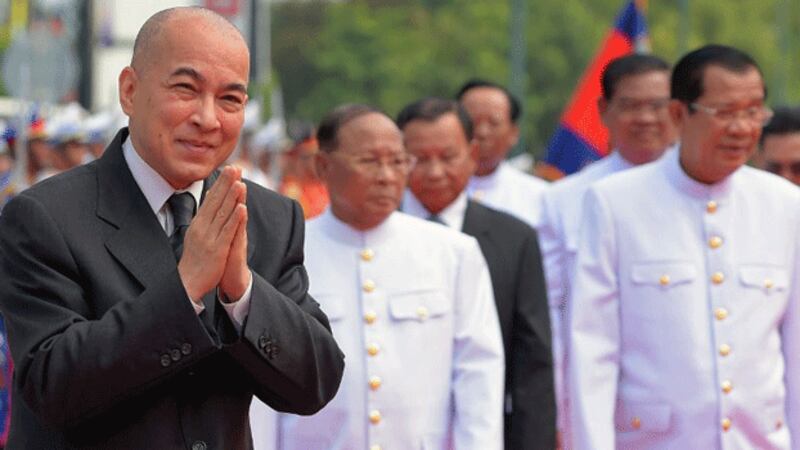Cambodia held the opening session of its National Assembly on Wednesday, drawing scorn from political observers and members of the public who dismissed the now one-party legislature as illegitimate following an election widely seen as unfree and without the participation of the country’s opposition.
The ruling Cambodian People’s Party (CPP) has said that party candidates who contested in the July 29 general election won all 125 parliamentary seats in a landslide victory that also secured another five-year term for strongman Prime Minister Hun Sen to add to his 33 years in office.
The new lawmakers were sworn in by King Norodom Sihamoni who presided over the opening session of parliament, attended by Hun Sen, foreign ambassadors, and representatives of non-governmental organizations.
The government had sent invitation letters to 31 foreign embassies in Cambodia, but only 22 dispatched representatives to the session, according to National Assembly Secretary-General Leng Penglong.
Diplomats from the U.S., Canada, Australia, France, Germany, the U.K., Sweden, Bulgaria, and the European Union did not attend, he said.
Rights groups, the United Nations, and Western countries have slammed the election as a fraud.
The U.S. called it “neither free nor fair” and said it “failed to represent the will of the Cambodian people,” while the EU charged that it was “not representative of the democratic will of the electorate.”
Days before the election, the U.S. House of Representatives passed legislation that would allow Washington to impose sanctions on Hun Sen and members of his inner circle for their role in undermining democracy in the country and committing human rights violations. The Senate is reviewing the legislation known as the Cambodia Accountability and Return on Investment Act of 2018.
Ly Sreysros, leader of a group of young political analysts who were students of late political pundit Kem Ley—widely believed to have been murdered by the CPP—said the absence of diplomats on Wednesday signaled the disapproval of several key countries.
“The new one-party Assembly will be less effective because it now lacks the checks-and-balance system that it had when there were opposition party members,” he told RFA’s Khmer Service.
In the run-up to the elections, Cambodia’s Supreme Court dissolved the main opposition Cambodia National Rescue Party (CNRP) over allegations that it was involved in a plot to topple the government. Party officials were stripped of their posts and 118 lawmakers were banned from politics for five years.
The government also shut down independent media outlets, placed restrictions on civil society, and quieted dissenting voices under the pretext that Hun Sen’s opponents were conspiring with foreign powers to topple his government.

Bogus institutions
Others in Cambodia criticized the new National Assembly borne of an election they believe was manipulated by the ruling party, despite Hun Sen’s claims that the government had “upheld democracy” during the vote.
Outspoken Buddhist monk Buth Buntenh, who lives in exile in the U.S., said all state institutions now filled by officials voted into power through the “sham elections” lack legitimacy.
“July’s national election was a sham. Therefore, the government that was formed from the election is also a sham,” he said. “When the government is a sham, the prime minister and other ministers are shams as well. When all state institutions are bogus, our nation will become a nation without a future.”
Buth Buntenh also said that the king was under duress because he was forced by the government to speak at the Assembly’s opening session.
A resident of Kampong Cham province, on the central lowlands of the Mekong River, meanwhile said he has no faith in the new regime.
“I don’t support the new National Assembly as a one-party assembly,” said the man who declined to give his name. “I don’t support it because the election was not transparent.”
A resident of northwest Cambodia’s Banteay Meanchey province said the one-party parliament will do little to rein in corruption at the top levels of the country’s government.
“We have seen how the government talks about the election, but this is an artificial democracy,” he told RFA. “He [Hun Sen] doesn’t care about the people’s interests.”
“Now the international community has put pressure on Cambodia, so the [Cambodian] people will face difficulties in the future,” he said.
‘We will not let the people down’
Political scientist Em Sovannara said the national economy will suffer from deteriorating relations with the U.S. and EU and that improved relations with regional powerhouse China will not make up the shortfall.
“The U.S. Senate is going to finalize the draft law on freezing the assets of 16 Cambodian dignitaries,” he said, referring to the Cambodia Accountability and Return on Investment Act. “Economic sanctions are gradually coming, and I don’t think China’s help will be enough for Cambodia.”
But CPP spokesperson Sok Eysan said the government does not care if powerful global players like the U.S and EU refuse to recognize it, because other nations will step in and support Cambodia politically and economically.
The CPP will implement the policy pledges that it made to the Cambodian people, he said.
“We will not let the people down,” he said.
Reported by RFA's Khmer Service. Translated by Nareth Muong and Sok Ry Sum. Written in English by Roseanne Gerin .
